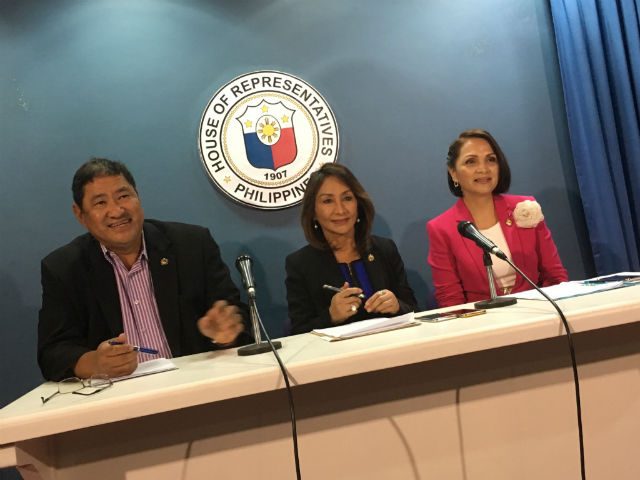SUMMARY
This is AI generated summarization, which may have errors. For context, always refer to the full article.

MANILA, Philippines – Three ranking members of the House of Representatives believe the bill lowering the minimum age of criminal responsibility and the measure banning corporal punishment of children are not contradictory to each other.
Deputy Speaker Gwendolyn Garcia, justice committee chairperson Reynaldo Umali, and ecology committee chairperson Estrellita Suansing were asked in a press conference on Monday, February 27, how to reconcile the two bills pending at the House.
Umali’s committee is currently deciding whether to propose the lowering of the age of criminal responsibility to either 9 or 12 years old from the current 15 years old. This measure is a legislative priority of President Rodrigo Duterte.
The House committee on welfare of children, meanwhile, approved the measure that would prohibit corporal punishment of children at home, in schools, and other institutions.
“Sa akin, wala naman sigurong conflict ‘yun… Ang pinag-uusapan natin dito [sa lowering the minimum age of criminal responsibility bill] kasi is ‘yung those involved ang crime. ‘Yung mga sa corporal punishment [bill], ‘di naman crime ‘yun. Naughtiness or pettiness of the child – ‘yun ang prini-prevent natin,” said Umali.
(For me, I don’t think there’s a conflict there… What we’re talking about in the bill lowering the minimum age of criminal responsibility are those involved in crimes. Under the corporal punishment bill, those aren’t crimes. Those are acts involving the naughtiness or pettiness of the child which we are aiming to prevent.)
He explained that Republic Act (RA) 9344, known as the Juvenile Delinquency Act of 2006, failed to properly protect children against the commission of crimes.
RA 9344, also called the Pangilinan Law after its author Senator Francis Pangilinan, raised the minimum age of criminal responsibility from 9 to 15 years old.
“Now we see a proliferation of children being used in criminal activities. So again ang question ko (my question is): Are we going to maintain the status quo, having seen that raising it from 9 to 15 did not produce the objective of the law?” asked Umali.
Garcia shared Umali’s sentiments. The Cebu 3rd District Representative said she saw how children were being used to commit crimes when she was still governor.
“Instead of protecting children, these opened the floodgates for criminal syndicates and even criminal-minded parents na gagamitin ‘yung mga bata to commit crimes (to use these children to commit crimes),” said the lawmaker.
Garcia, however, failed to provide specific data from her province.
Suansing also explained why she co-authored the bill lowering the age of criminal responsibility.
“The reason why [we are pushing for this bill] is because of the rising incidence of juvenile offenders. We are sending a message to the parents to be responsible and accountable for the acts of their children,” she said.
Lowering the minimum age of criminal responsibility is one of the contentious issues being tackled at the House. (READ: Lower age of criminal liability? Here’s why psychologists are against it)
Various technical working group meetings between congressmen and national agencies showed that most departments are against the proposal to make child offenders as young as 9 be made criminally liable.
Bill co-author and Speaker Pantaleon Alvarez reasoned that should the measure be passed into law, youth offenders will not be sent to jail with hardened criminals. Rather, they will be rehabilitated. – Rappler.com
Add a comment
How does this make you feel?
There are no comments yet. Add your comment to start the conversation.